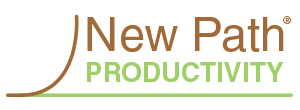|
[2.5 Minute Read or Listen Below] If you or someone you know feels overwhelmed, raise your hand. There are a lot of us raising our hands! A Harvard Business Review article supports this, stating most of us feel constantly overwhelmed with the demands, increasing complexity, and frantic pace of work. On top of that, we also have personal and family commitments. The toll this takes on us emotionally, not to mention the hit to our productivity and relationships, is staggering. We're paying the price with our mental health, our self-esteem, and shrinking downtime.
Living in this constant state of overwhelm impacts our cognitive function, resulting in forgetfulness, confusion, lack of concentration, reduced capacity to problem-solve, and general mental slowness. It also increases feelings of fatigue, making us more easily distracted, leading to even deeper feelings of overwhelm.
Most of us cope with these feelings of overwhelm by working more hours, believing that just powering through is the solution. But sacrificing sleep and downtime usually worsens the problem. Also, by perpetuating the cycle of overwhelm, fatigue, and impaired thinking, we start to lose confidence and often begin a pattern of negative self-talk. If you're feeling this way, don't despair. You're not a lost cause, and there is hope. By implementing systems to relieve your decision fatigue and creating an environment that supports you, you can start to lift the fog of overwhelm. The HBR article makes some great suggestions:
Identifying the source of your stress can free your mind enough to develop a plan of action. In my experience, when we spend too much time focusing on (and continually telling others about) how much we have to do, we hold ourselves in a mindset of inaction. The words we say to ourselves and others matter! Focus on mindful, patient, and action-oriented self-talk. Setting boundaries is not always easy because we don't want to let others or ourselves down. But there is a proven point of diminishing returns when we work an insane number of hours. We make more mistakes, creating a need to re-do our work. Boundaries can be the gateway to incorporating more downtime and disconnection in our lives. As stress levels reduce, clarity of thinking returns. Curbing perfectionism goes a long way. As Winston Churchill said, "Perfection is the enemy of progress." By not finishing tasks and projects because we want to tweak them to perfection, they continue to hang over us and prevent a sense of accomplishment. To be clear, I'm not advocating for sloppy work. But at some point, good enough is good enough. Think about whether something truly needs your time and attention. If you can outsource or delegate something, seize the opportunity! While taking something off your plate, you may be creating growth and developmental opportunity for someone else. Our old patterns of thinking and behavior can be hard to break. But, let's face it. A lot of what we tell ourselves isn't true. The stories are comforting because they provide an excuse not to do the more challenging work. But getting yourself unstuck and more grounded in reality can generate powerful momentum. Overwhelm will happen to all of us, and the cognitive effects are undeniable. Take proactive steps to maintain control and recognize when overwhelm is creeping in to minimize its impact and duration. Want to escape your overwhelm? Start with your free Productive Environment Score at www.newpathpro.com/scorecard.
0 Comments
Your comment will be posted after it is approved.
Leave a Reply. |
Kathy Muzik
|
New Path Productivity®, LLC provides worldwide virtual and Chicagoland onsite services for individuals and businesses to increase productivity
through organization and management of resources (e.g., energy, information, people, processes, space, and time).
through organization and management of resources (e.g., energy, information, people, processes, space, and time).
|
|
Phone847.748.0144
|
AddressPO Box 162
Highland Park, IL 60035 |
Privacy Policy Terms of Use
New Path Productivity®, LLC © 2015 - 2024 All Rights Reserved
New Path Productivity®, LLC © 2015 - 2024 All Rights Reserved



 RSS Feed
RSS Feed
